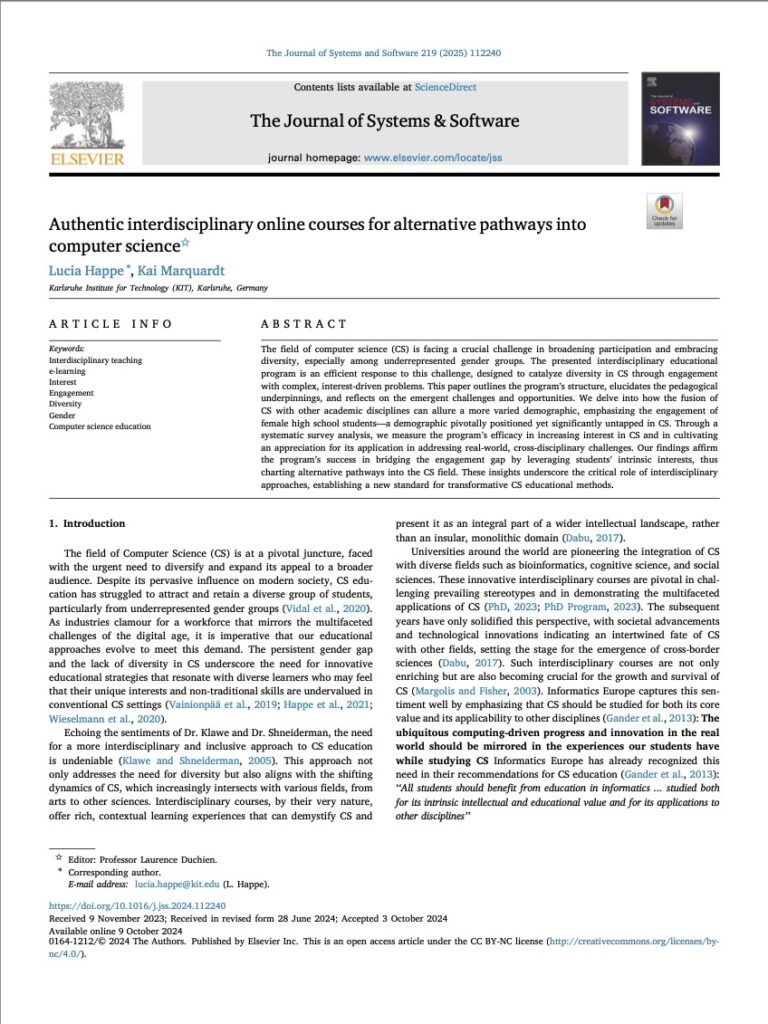Why interdisciplinary learning makes coding click?
What do bees, climate change, and outer space have in common with computer science?
If your first thought was “not much,” you’re not alone. But at RockStartIT, we’re proving that connecting computer science with the real world doesn’t just make it more engaging, inclusive, creative, and fun. Let’s face it: traditional computer science education can be hard to break into. Full of rigid logic, dry theory, and intimidating code, it often leaves curious minds standing at the door, especially students who don’t see themselves as “techy”.
So, we decided to open that door wide. If you want to dive deeper into the research behind it, check out our full article in the Journal of Systems and Software here.
Learning That Starts With Wonder
Imagine you’re 13, and someone tells you, “Let’s learn coding today.” You might panic. But what if they said, “Let’s find out why the bees are dying and how you can help?” Suddenly, you’re not just learning to code but on a mission.
That’s the magic of interdisciplinary learning. It flips the script from “you need to learn this” to “you want to learn this.”We designed expeditions, short, interactive online courses where students explore big, real-world problems using computer science tools. These expeditions are like virtual adventures, where students can apply their coding skills to real-life situations.
You don’t need to know what a for-loop is to join. You need curiosity.
In our Save the Bees expedition series, students explore biology, data science, and artificial intelligence through the lens of bee health. They build websites to spread awareness, use SQL to analyse bee population data, and even train their own AI to recognise bees on camera—all with no prior experience required.
The In Search of Other Life expedition turns students into space explorers, programming rockets, decoding camera signals, and transmitting images from the stars. Other expeditions let them sort vegetables with algorithms or understand climate change with the help of code.
Every step is about discovery, not perfection.
We’ve learned that interest grows when students see why they’re learning something and how it connects to their world. Coding becomes less scary when it’s a tool to solve a problem you care about. Students didn’t just have fun after participating in our interdisciplinary courses—they gained confidence. Even those who started out unsure about coding reported feeling more capable and curious by the end. Interest in computer science rose, especially among those who initially thought it wasn’t for them.
Because when learning feels human, it becomes transformative.
Yes, we designed this with girls in mind, often cited as a group that feels least at home in computer science classrooms. But what we discovered goes beyond such distinctions. Interdisciplinary, problem-based learning doesn’t just support girls, it opens the door for anyone who’s ever felt unsure, underprepared, or unwelcome in tech. Whether a student lacks confidence, spends little time on computers, or believes coding “just isn’t for them,” this approach offers a way in.
And when classrooms make space for all kinds of learners, teachers tell us something shifts: engagement rises, stereotypes fade, and curiosity becomes contagious.
It’s not about diluting computer science. It’s about enriching it with meaning.
What’s Next?
Suppose you’re an educator, policymaker, or parent wondering how to get more kids into computer science, especially those who don’t fit the typical “coder” mould. In that case, the answer might be more straightforward than you think: It’s up to you to advocate for and implement interdisciplinary learning in computer science education.
For instance, you could integrate coding into a biology class to analyse animal populations or use it in a geography class to understand climate change. The possibilities are endless. Make it interdisciplinary, relevant, and a little bit wild.
Because when we show students that coding can help save bees, explore galaxies, and decode the natural world’s mysteries, we’re not just teaching them a subject.
It’s not just about learning a subject. It’s about unlocking a superpower.
by Lucia Happe

